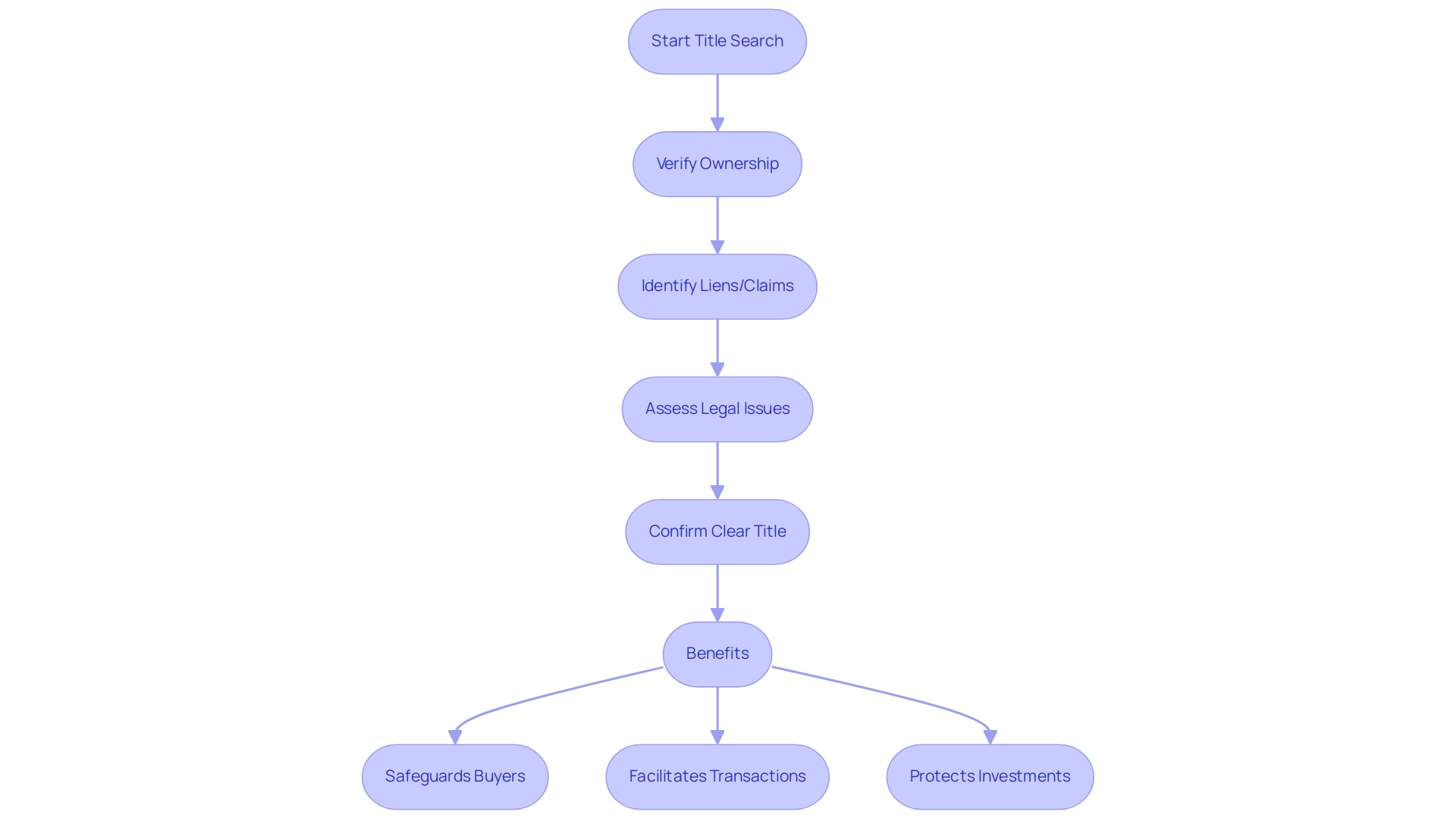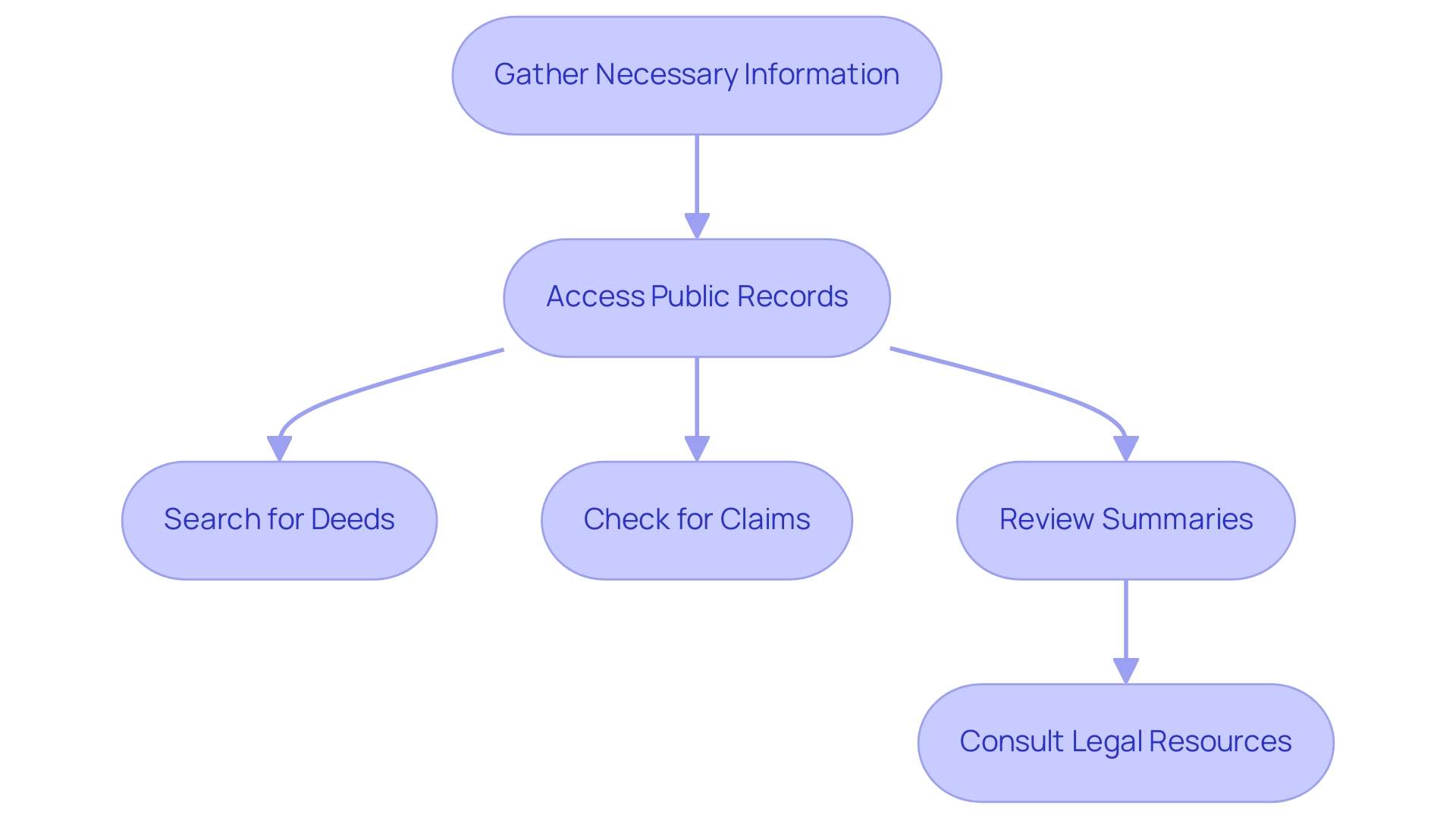Introduction
In the intricate world of real estate, the significance of property title searches cannot be overstated. These searches serve as a critical safeguard for buyers, ensuring that ownership is legitimate and free from unexpected encumbrances that could jeopardize investments. By meticulously examining the history of a property, potential issues such as liens and ownership disputes can be identified, allowing for informed decisions in the buying process.
This article delves into the essential steps for conducting a title search, explores the various types of searches available, and addresses common challenges faced during the process, equipping readers with the knowledge necessary to navigate the complexities of property ownership confidently.
Understanding the Importance of Property Title Searches
Title investigations are essential for verifying ownership and recognizing any liens or claims on an asset. They assist in guaranteeing that buyers are safeguarded from possible conflicts regarding ownership and that the asset can be sold or financed without legal issues. Conducting a thorough title search uncovers any issues that may affect the asset's value or the buyer’s ability to obtain clear title, thus safeguarding investments and facilitating smooth real estate transactions.

Step-by-Step Guide to Conducting Your Own Title Search
- Gather Necessary Information: Start by collecting all relevant details about the asset, including the address, parcel number, and the names of current and previous owners.
- Access Public Records: You can learn how to find home title online by visiting your local county clerk or recorder's office, or by checking their website to access public land records. Many counties offer online databases that provide information on how to find home title online for convenience.
- Search for Deeds: Look for the land deed, which provides information on ownership history. Pay attention to any documented claims or encumbrances.
- Check for Claims: Investigate any outstanding claims against the asset, which could impact ownership rights. This may include tax liens, mortgage liens, or mechanic's liens.
- Review Summaries: If available, review abstracts or reports that summarize .
- Consult Legal Resources: If needed, refer to legal resources or consult with a real estate attorney for complex issues or interpretations of legal documents.

Can You Skip the Title Company? Exploring Your Options
While it is possible to perform a property investigation independently, employing provides various benefits, including access to specialized expertise, resources, and coverage against possible flaws in ownership. Companies specializing in property documentation possess the expertise to identify complex issues and can offer insurance, which safeguards buyers from unexpected claims. However, for those with the necessary skills and resources, conducting a title search on their own can save costs.
It's essential to weigh the benefits against the potential risks involved in skipping professional assistance.
Exploring Different Types of Title Searches
-
Full Title Search: This thorough examination encapsulates the entire history of the land. It includes a detailed review of all previous owners, liens, and legal claims, ensuring that any potential issues are identified early in the process.
A complete examination is crucial for offering a thorough assessment of the asset's legal status. The typical document review can require anywhere from 10 to 14 days to finalize, indicating the time investment involved.
-
: Conversely, a restricted examination is more concentrated, addressing specific concerns that may impact the real estate, such as .
While this kind of inquiry can be quicker to complete, it may overlook critical historical details that could pose risks to ownership. Considering the intricacy of legal documents, performing a restricted title inquiry alone can be difficult and may not provide a full understanding of the asset's status.
-
Judgment Inquiry: This inquiry is essential for recognizing any court rulings against the current landholder.
Such judgments can significantly influence ownership rights or lead to unexpected financial responsibilities, making this inquiry essential for ensuring a clear title.
-
Bankruptcy Inquiry: A bankruptcy inquiry is carried out to determine whether the owner of the asset has filed for bankruptcy. This information is especially significant, as a bankruptcy filing can influence ownership by introducing complications and potential liens.
-
Tax Inquiry: This investigation reveals any unpaid real estate taxes, which can result in liens or, in severe instances, foreclosure. Comprehending the tax status of a property is crucial for preventing expensive surprises and confirming that the deed is clear of any encumbrances.
The selection of inquiry type can greatly affect the result of a property investigation. While individuals may try to perform their own property investigations by accessing public records, understanding how to find home title online can help make this lengthy and complex process easier.
As emphasized in a case study, while self-performed document reviews are feasible, they frequently lead to tedious experiences and may cause expensive errors if not carried out properly. This highlights the significance of working with knowledgeable title specialists to identify the most suitable type tailored to specific circumstances.
Common Challenges in Title Searches and How to Overcome Them
- Incomplete Records: Public records may be missing or incomplete. To overcome this, check multiple sources, including how to as well as online databases and physical records at county offices.
- Discrepancies in Ownership: Ownership records may show conflicting information. Cross-reference with other documentation and consult legal experts if necessary.
- Complex Legal Language: Title documents often contain legal jargon. Utilize resources like legal dictionaries or consult with a real estate attorney to clarify terms.
- Time Constraints: Title searches can be time-consuming. To streamline the process, create a checklist of necessary documents and information before starting your search.
- Understanding Claims: It can be challenging to interpret the implications of claims. Seek guidance from professionals or educational resources to fully understand how liens affect property ownership.

Conclusion
Conducting a property title search is an indispensable step in the real estate acquisition process. As outlined, these searches ensure that buyers are protected from potential ownership disputes and financial liabilities, ultimately safeguarding their investments. By understanding the importance of thorough title searches and the various types available—ranging from full to limited searches—buyers can make informed decisions that mitigate risks associated with property ownership.
The step-by-step guide provided emphasizes the necessity of gathering accurate information and accessing public records, while also weighing the option of hiring a title company against conducting a search independently. Each approach has its merits, but the complexities involved in title searches often warrant the expertise of professionals to navigate potential pitfalls effectively.
Addressing common challenges, such as incomplete records and discrepancies in ownership, reinforces the importance of diligence and the use of available resources. By being proactive and informed, buyers can ensure a smoother transaction process and avoid unforeseen complications. Ultimately, a comprehensive title search not only facilitates clear ownership but also fosters confidence in real estate investments, empowering buyers to embark on their property journeys with assurance.
Frequently Asked Questions
What is the purpose of title investigations?
Title investigations are essential for verifying ownership and identifying any liens or claims on an asset. They help ensure that buyers are protected from potential ownership disputes and that the asset can be sold or financed without legal complications.
What steps are involved in conducting a title search?
The steps involved in conducting a title search include: 1. Gather necessary information about the asset. 2. Access public records to find home title information. 3. Search for deeds and check for any claims against the asset. 4. Review summaries or reports of the property’s history. 5. Consult legal resources if needed.
Can I perform a title search on my own?
Yes, it is possible to conduct a property investigation independently. However, hiring a title firm offers benefits such as specialized expertise, resources, and insurance against potential ownership flaws. Weighing the benefits against the risks of skipping professional assistance is essential.
What are the different types of title searches?
The different types of title searches include: 1. Full Title Search: A comprehensive examination of the entire ownership history and any legal claims. 2. Restricted Title Examination: A focused inquiry on specific concerns like outstanding liens, which may miss critical historical details. 3. Judgment Inquiry: Identifies any court rulings against the current landholder that could affect ownership rights. 4. Bankruptcy Inquiry: Determines if the asset owner has filed for bankruptcy, which can complicate ownership. 5. Tax Inquiry: Reveals any unpaid real estate taxes that could result in liens or foreclosure.
What challenges might arise during a title search?
Challenges during a title search may include: 1. Incomplete records: Public records may be missing; check multiple sources for information. 2. Discrepancies in ownership: Conflicting information may require cross-referencing and legal consultation. 3. Complex legal language: Legal jargon can be difficult to understand; using legal dictionaries or consulting an attorney can help. 4. Time constraints: Title searches can be time-consuming; creating a checklist can streamline the process. 5. Understanding claims: Interpreting claims can be challenging; seeking professional guidance can clarify their implications.




